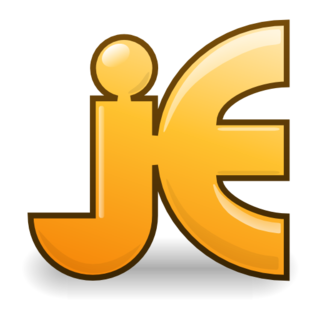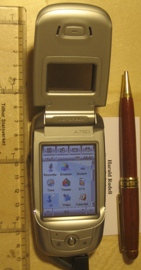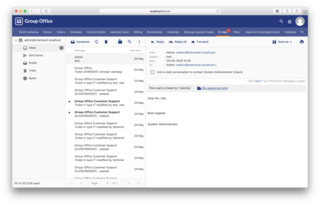In computing, serialization is the process of translating a data structure or object state into a format that can be stored or transmitted and reconstructed later. When the resulting series of bits is reread according to the serialization format, it can be used to create a semantically identical clone of the original object. For many complex objects, such as those that make extensive use of references, this process is not straightforward. Serialization of object-oriented objects does not include any of their associated methods with which they were previously linked.

Tiki Wiki CMS Groupware or simply Tiki, originally known as TikiWiki, is a free and open source Wiki-based content management system and online office suite written primarily in PHP and distributed under the GNU Lesser General Public License (LGPL-2.1-only) license. In addition to enabling websites and portals on the internet and on intranets and extranets, Tiki contains a number of collaboration features allowing it to operate as a Geospatial Content Management System (GeoCMS) and Groupware web application.

SOGo is an open source collaborative software (groupware) server with a focus on simplicity and scalability.

PhpGedView is a free PHP-based web application for working with genealogy data on the Internet. The project was founded and is headed by John Finlay. It is licensed under the GPL-2.0-or-later license.

jEdit is a free software text editor available under GPL-2.0-or-later. It is written in Java and runs on any operating system with Java support, including BSD, Linux, macOS and Windows.
The PHP Extension and Application Repository, or PEAR, is a repository of PHP software code. Stig S. Bakken founded the PEAR project in 1999 to promote the re-use of code that performs common functions. The project seeks to provide a structured library of code, maintain a system for distributing code and for managing code packages, and promote a standard coding style. Though community-driven, the PEAR project has a PEAR Group which serves as the governing body and takes care of administrative tasks. Each PEAR code package comprises an independent project under the PEAR umbrella. It has its own development team, versioning-control and documentation.

Kontact is a personal information manager and groupware software suite developed by KDE. It supports calendars, contacts, notes, to-do lists, news, and email. It offers a number of inter-changeable graphical UIs all built on top of a common core.
The following tables compare general and technical information for many wiki software packages.
Kolab is a free and open source groupware suite. It consists of the Kolab server and a wide variety of Kolab clients, including KDE PIM-Suite Kontact, Roundcube web frontend, Mozilla Thunderbird and Mozilla Lightning with SyncKolab extension and Microsoft Outlook with proprietary Kolab-Connector PlugIns.

The Motorola A780 is the second cellular PDA running the Linux operating system.

Gramps is a free and open source genealogy software. Gramps is programmed in Python using PyGObject. It uses Graphviz to create relationship graphs.

Group-Office is a PHP based dual license commercial/open source groupware and CRM and DMS product developed by the Dutch company Intermesh. The open source version, Group-Office Community, is licensed under the AGPL, and is available via GitHub. GroupOffice Professional is a commercial product and offers additional business modules like project management, finance, HR and time tracking.
EGroupware is free open-source groupware software intended for businesses from small to enterprises. Its primary functions allow users to manage contacts, appointments, projects and to-do lists. The project releases its software under the terms of GNU General Public License (GPL).
Zarafa was an open-source groupware application that originated in the city of Delft in the Netherlands. The company that developed Zarafa, previously known as Connectux, is also called Zarafa. The Zarafa groupware provided email storage on the server side and offered its own Ajax-based mail client called WebAccess and a HTML5-based, WebApp. Advanced features were available in commercially supported versions. Zarafa has been superseded by Kopano.
The following outline is provided as an overview of and topical guide to the Perl programming language:
Kopano is an open-source groupware application suite originally based on Zarafa. The initial version of Kopano Core (KC) was forked from the then-current release of Zarafa Collaboration Platform, and superseded ZCP in terms of lineage as ZCP switched to maintenance mode with patches flowing from KC. Kopano WebApp similarly descended from Zarafa WebApp. Since October 2017, Kopano Core is also known more specifically as Kopano Groupware Core, since Kopano B.V. developed more products that were not directly requiring groupware components.






